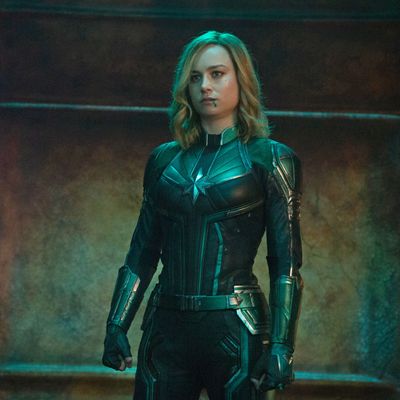
In a world where toilet-paper companies are stanning for gay rights, it’s not surprising that many of our biggest pop-cultural experiences have found second identities as political platforms. Through the magic of online discourse, Nanette became the #MeToo movement, Lemonade became intersectional feminism, Hamilton became centrist Democrats. Since art is not a position paper, these new identities are not always fixed: To many viewers, a vote for Green Book was a vote for the white gaze; to actual Oscar voters, it was a vote for slowing down and listening to each other.
But there’s no debate about what Captain Marvel stands for. After 11 years and 20 previous installments, Anna Boden and Ryan Fleck’s film is the first entry in the Marvel Cinematic Universe to center on a female hero, a small victory for anyone who believes women deserve an equal place in the industry’s most dominant genre. And Disney, which is counting on Brie Larson’s Carol Danvers to anchor its next phase of Avengers movies, has been happy to lean into its newest hero’s status as a feminist icon, selling the message that the film is not just a cell in an Excel spreadsheet labeled “Q1 2019,” but a boundary-breaking moment for women and girls. To its credit, this does not seem to be just talk: Larson has been working with USC’s Annenberg Inclusion Initiative to make the film’s press days more inclusive for journalists who aren’t able-bodied white men.
Quite predictably, this did not go over well with the type of people whose hackles get raised by the notion that a piece of art might be intended for someone other than themselves, and after Larson’s old quote about not wanting to listen to a “40-year-old white dude” review A Wrinkle in Time started making the rounds, the telephone game of social media created the message that Brie Larson did not want white men seeing her movie. YouTubers made videos about the actress “ruining Marvel” by introducing “divisive identity politics” to the franchise, and you don’t have to look too deep into the corners of the internet to see complaints calling her a sexist and/or a racist. The film’s Rotten Tomatoes page was so inundated with negative user reviews that the website banned non-critics from rating films before they opened. (Why you used to be able to review movies you hadn’t seen yet is a question for another day.)
This fracas had the effect of further cementing Captain Marvel as a capital-C Cause, which is good business not only for Disney (the film is tracking for a $150 million domestic opening), but also everyone who makes a living publishing their opinion on the internet: A bold stand travels well, while wishy-washy takes tend to fade into the ether. The stage was set for another great culture war, progressives on one side, angry geeks on the other. Lace up your internet gloves and get ready for another round of the fistfights that occasioned the releases of Wonder Woman and Last Jedi.
Except that, once the embargo broke this week, it turned out that Captain Marvel was … fine. Larson gives an enjoyable performance, but despite some fun business with a cat, consensus seems to be that it’s a slightly underdeveloped MCU entry, more aperitif than entrée. And when it comes to gender politics, the film doesn’t say much that couldn’t fit in a shoe commercial.
Which is okay enough, as far as things go. There are certainly plenty of mediocre superhero movies about men. But it makes the stakes of the discussion go a little off-kilter. Captain Marvel is a movie you want to say nice things about because the worst people on the internet are against it, but that also feels slightly false because it’s just okay. As Thrillist’s Emma Stefansky put it, “we got ghostbustered y’all.”
You remember Paul Feig’s all-female Ghostbusters remake, which arrived in the marginally more innocent days of summer 2016 and offered almost a point-by-point preview of the Captain Marvel experience: the same geek-culture backlash, the same media stanning, and ultimately the same dispiriting result — a forgettable epic whose sky-high budget and expectations cost it, in the words of Alyssa Rosenberg, “the ability to say anything risky and harsh and true.” Three years later, the online conflict surrounding the movie is the only thing anyone remembers about it.
That’s one of the less-explored downsides to these misogynist online firestorms, the way they force people who care about gender equality to spend large amounts of time and energy defending movies that aren’t always worth the effort. If there’s a lesson here, it’s that, with the recent exception of Black Panther, expecting bold political art to emerge from a massive commercial factory will almost always let you down. (The other lesson is that, while casual remarks about “white dudes” are uncontroversial in progressive circles, outside their original context the people being talked about remain very sensitive about that kind of thing.) Though they’re coming at the controversy from opposite ends, the trolls and Disney’s marketing department are both united in pushing the message that Captain Marvel is feminism incarnate. We don’t need to do that work for them.


